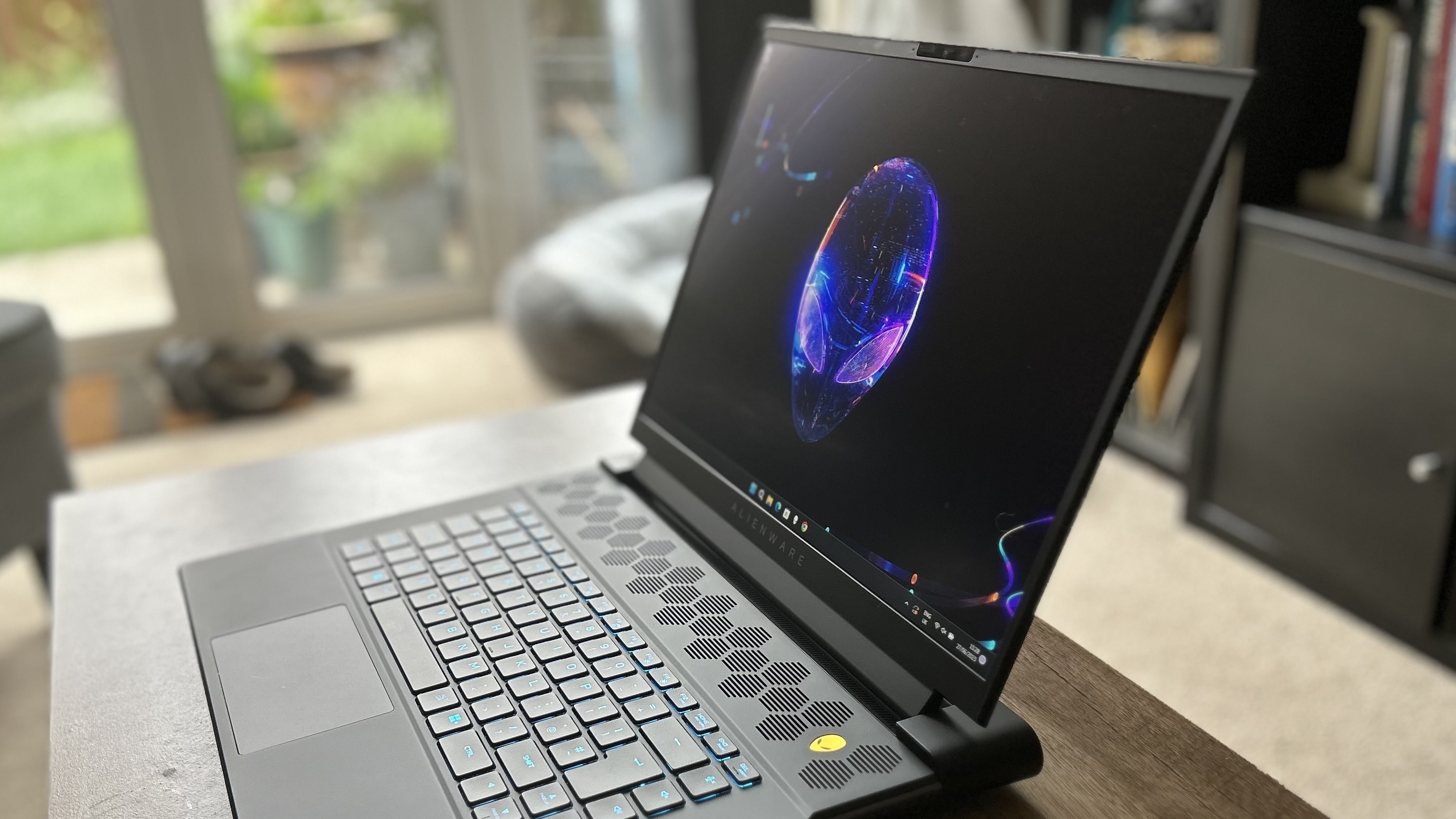GamesRadar+ Verdict
The Alienware M16 is perfect for those who need a sub-$2,000 gaming laptop to sit on their desk and remain there for most of the time. There's some excellent performance up for grabs here, even in the most basic of specs, but that clunky form factor still holds this machine back.
Pros
- +
Excellent price to performance ratio in lower specs
- +
Plenty of super fast ports
- +
Much cooler and quieter than previous generation
- +
Display is still impressive
Cons
- -
Chunky, heavy design isn't portable
- -
Grills take away palm space inside
Why you can trust GamesRadar+
The Alienware M16 is here to take over from its 15.6-inch sibling, and with Nvidia's RTX 40-Series graphics and the choice between Intel and AMD's latest processors, there's plenty to dig into here. There's no doubt about it, Alienware rigs are pricey, but the M-Series has always managed to tiptoe on the right side of that budget line. Doing away with a lot of the price padding of the more premium X-Series, I've always respected these laptops for their price/performance ratio.
In this generation of slightly more expensive gaming laptops, this ratio is still working in the Alienware M16's favor. However, some quality-of-life concerns are still rearing their heads as well. These chunky builds won't suit everyone, but they often provide the mid-range with plenty of performance for the cash. I spend weeks testing top-shelf configurations in my quest to find the best gaming laptop. Considering the previous generation Alienware M15 R7 was my go-to pick for most players who don't want to break the bank, though, I was more conservative in my spec for this generation. I took the RTX 4060 / Intel i7-13700HX out for a spin over the course of three weeks, to see just how this baseline spec compares against the best Alienware laptops on the market.
| Specs | Tested | Also Available |
|---|---|---|
| Price | $1,899.99 / £1,798.99 | $1,699.99 - $4,699.99 / £1,928 - £4,779 |
| Display | 16-inch QHD+ (2560 x 1600) @ 165Hz | 16-inch QHD+ (2560 x 1600) @ 240Hz | 16-inch FHD+ (1920 x 1200) @ 480Hz |
| Processor | Intel i7-13700HX | Intel i9-13900HX |
| GPU | RTX 4060 | RTX 4070 | RTX 4080 | RTX 4090 |
| RAM | 16GB DDR5 4800MHz | 32GB | 64GB |
| Storage | 512GB PCle NVMe M.2 SSD | 1TB | 2TB | 4TB | 8TB |
| Connectivity | Killer Wi-Fi 6E, Bluetooth | - |
| Ports | 1x HDMI 2.1, 1x USB 3.2 Gen 1 with powershare, 1x USB 3.2 Gen 1, 2x USB-C Gen 2 with DisplayPort, 1x RJ45 Ethernet, 1x 3.5mm audio, 1x mini-Display port, 1x SD card | - |
| Dimensions | 36.8 x 2.5 x 28.9cm | - |
| Weight | 3.25kg | - |
Design
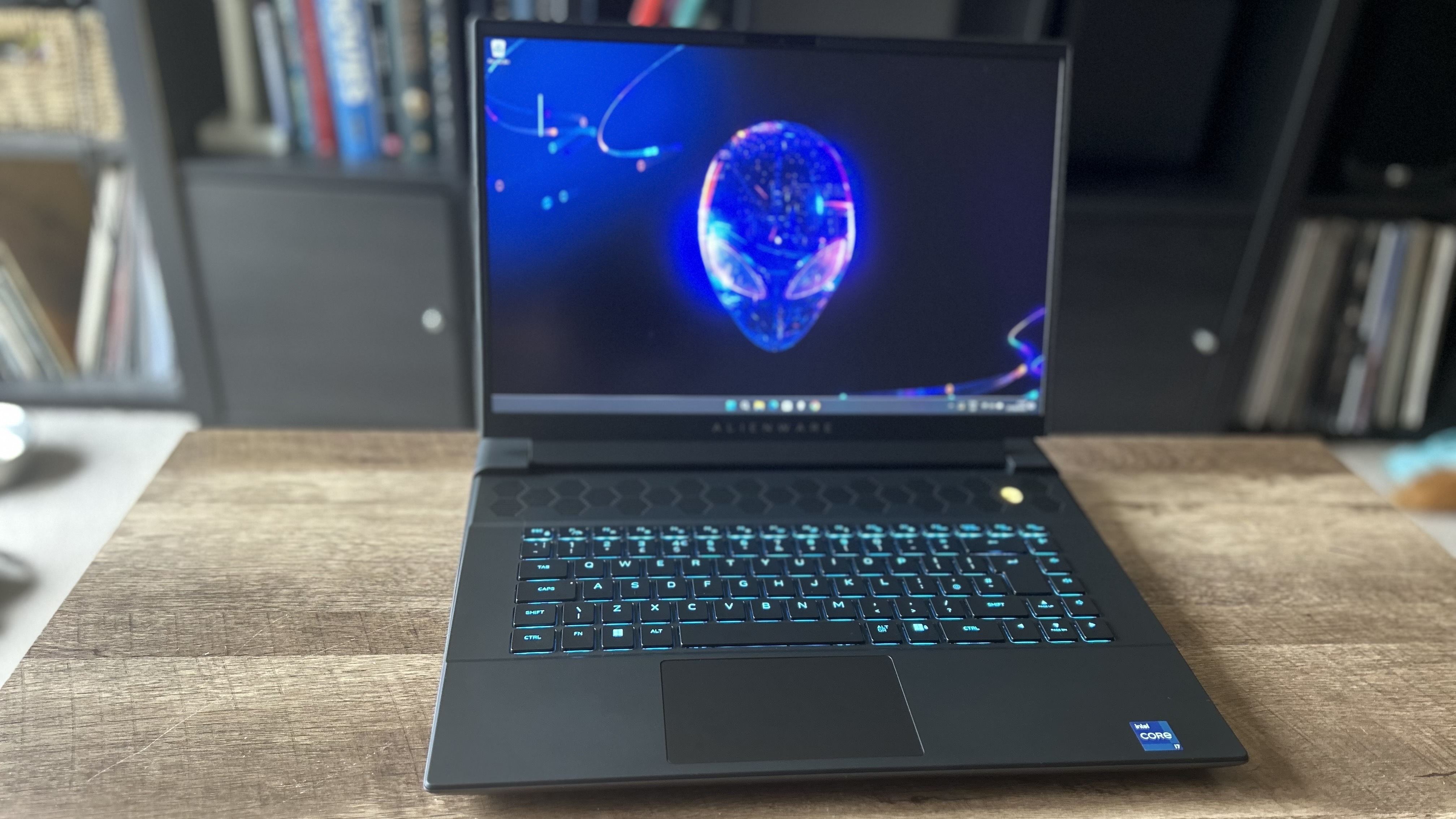
The Alienware M16 doesn't do much to change Dell's classic aesthetic. This is still a square-ish machine with a chunkier feel. That means it doesn't stand out quite as much in its thickness when compared with the gaming laptops of 2023. We're seeing more and more machines moving away from a particularly slimline build to accommodate those new-generation components, and in this landscape, the M16 feels almost thin... almost. It's a slight trick of the eye, though, because this is still a hefty machine. When the Asus ROG Strix Scar 16 weighs in at 2.5kg, the Alienware's 3.25kg heft is certainly something to consider if you're after a portable machine.
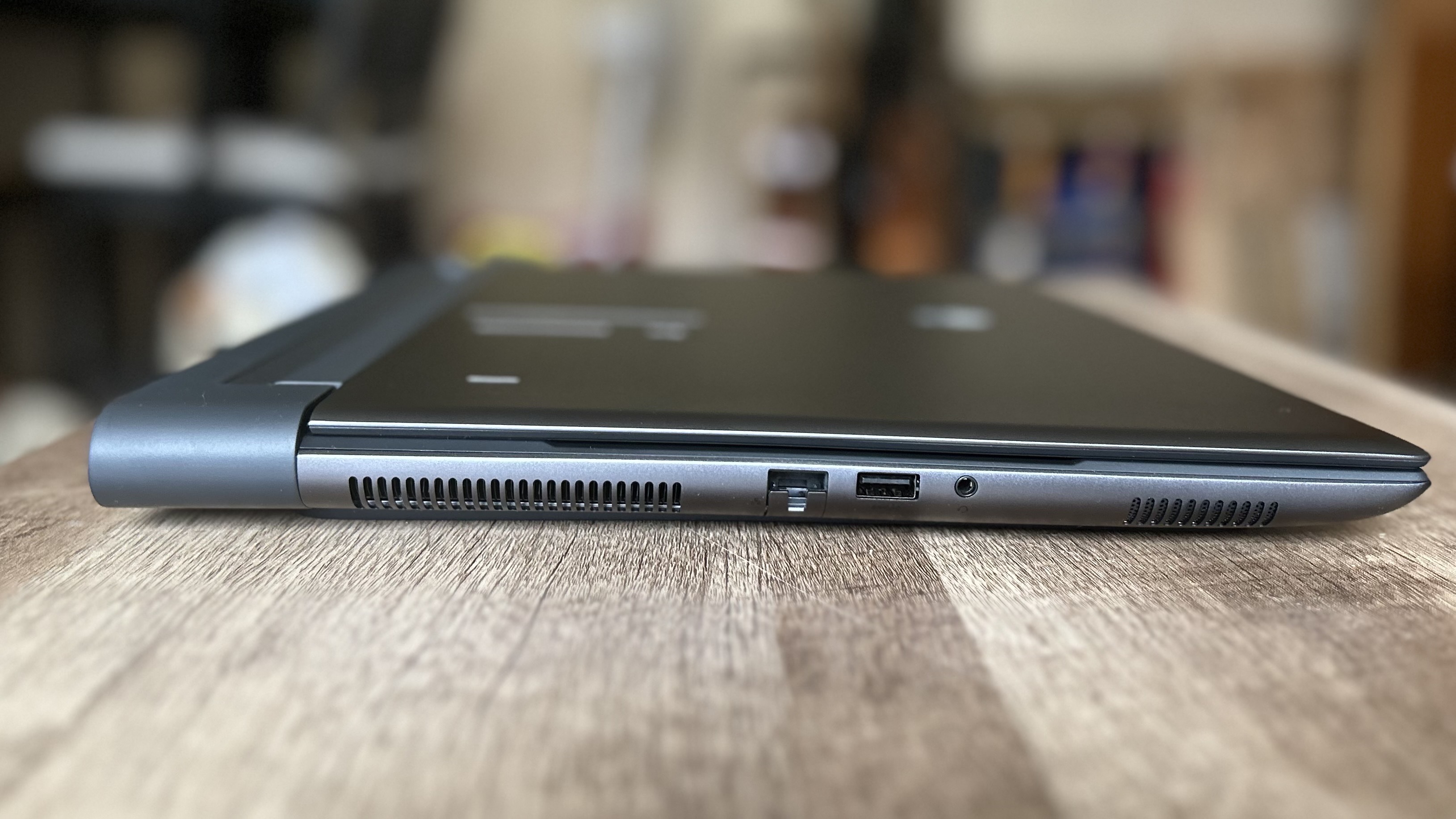
The rest of the design is firmly within the Alienware M-Series' repertoire. The centered keyboard, embossed '16' on the back, and additional space towards the rear have been seen time and time again. In 2023, these design elements are starting to feel tired. If it wasn't for that 16-inch display and physical marker on the lid, this could be any Alienware M laptop from the last four years. It's still an impressive aesthetic, pairing cool grey tones with flashy RGB and a relatively slimline profile, but it would be interesting to see Alienware playing with its look a little in future iterations.
There's nothing broken about that design, you're still getting the vibrant RGB elements around the main port section at the back, classic alien head branding, and hexagonal grills running along the top. It's all still as solid and durable as ever, with a matte coating that promises to keep things soft to the touch but equally resistant to fingerprints. No, you're still not getting the luxurious aluminum and magnesium alloy of the X-Series, but this is still an aluminum build.
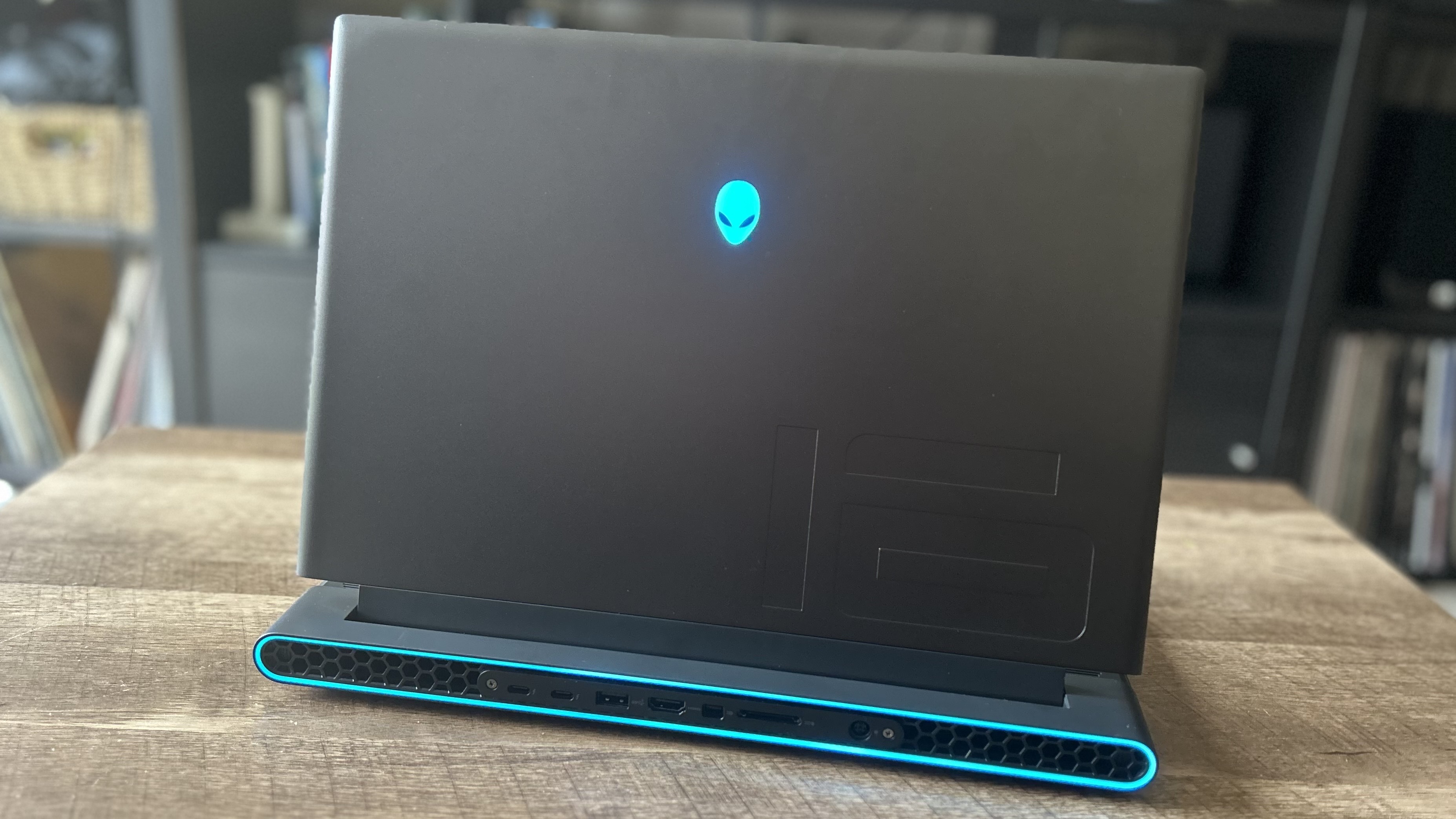
That extra size does pile onto one of Alienware's weakest points - portability. Even the Alienware M15 R7 felt too clunky to carry around on a daily basis, and the M16 doubles down on this. I struggled to even wedge it into a laptop backpack on my travels, and once it was in nothing else was going to fit safely.
Features
Unlike last year's edition, the M16 places its keyboard on a slightly recessed panel of the main chassis. While the M15 R7 framed this deck with raised edges, everything is flat here. That gives the illusion of far more space to type and, when combined with the excellent spacing on this deck, makes for a particularly comfortable experience overall. Yes, it's still shifted slightly further down the main body (thanks to the hexagonal grills running along the top) than you might be used to, but everything still feels central and easily accessible here.
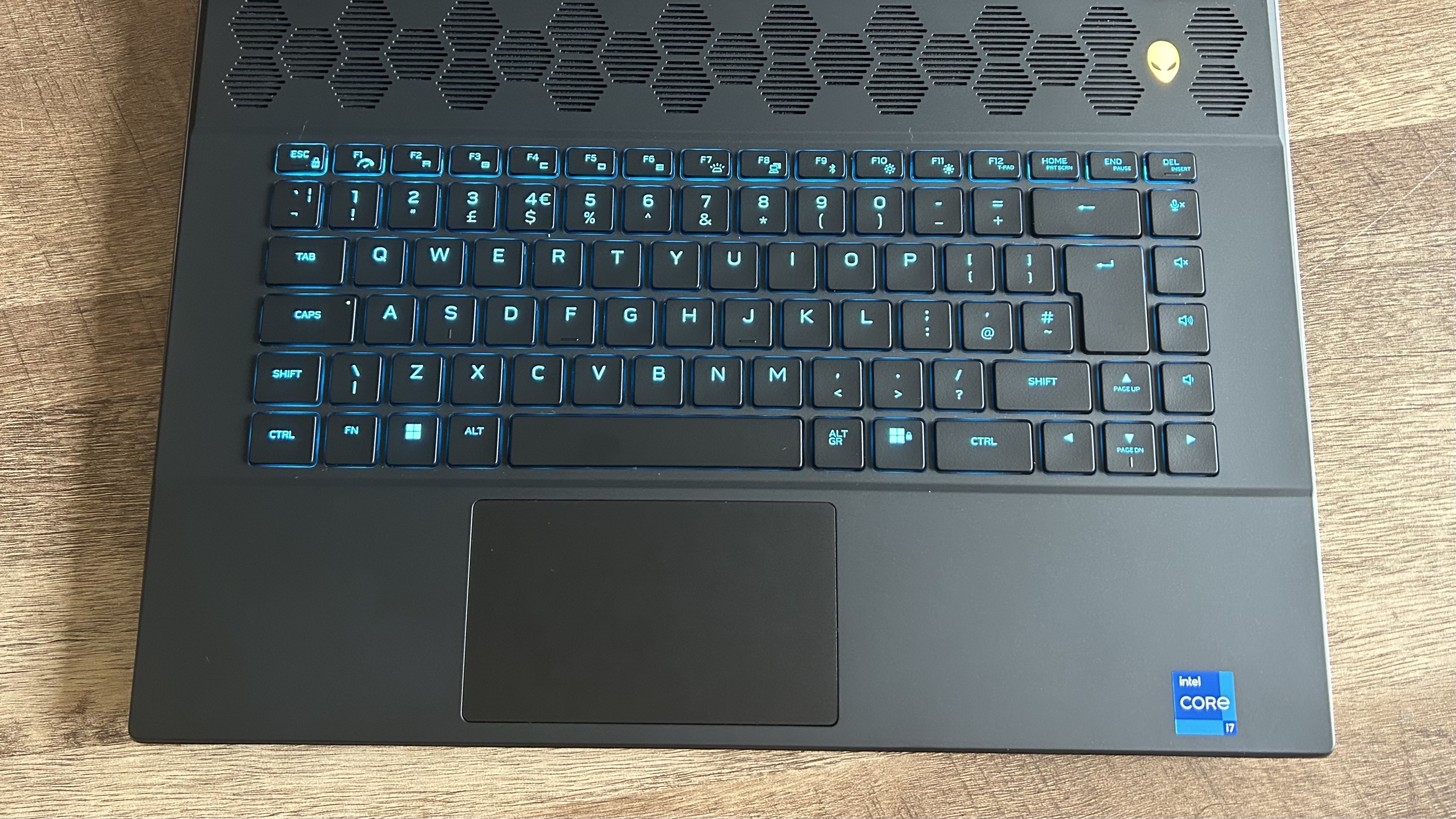
The keyboard itself is nice and responsive, with a tactile response despite the rubber dome construction. The M16 does also ship with a Cherry MX mechanical keyboard in more expensive configurations if you're looking to boost the type feel, though.
You've got a full suite of keys, though no number pad or dedicated media buttons. The latter is a slight disappointment, especially with this larger form factor. I was, however, pleased with the full-sized arrow and volume keys running down the right side.
While the keyboard works hard to give you plenty of space, though, the trackpad is remarkably small. That's a symptom of this squished internal design, and the result is a cramped pad placed so close to the edge of the main body it's almost impossible to use with precision or comfort when placed on a lap. Of course, the Alienware M16 has been developed for gaming, so you'll rarely use the trackpad outside of quick work sessions. However, many machines offer far greater versatility for those after a work / play hybrid machine.
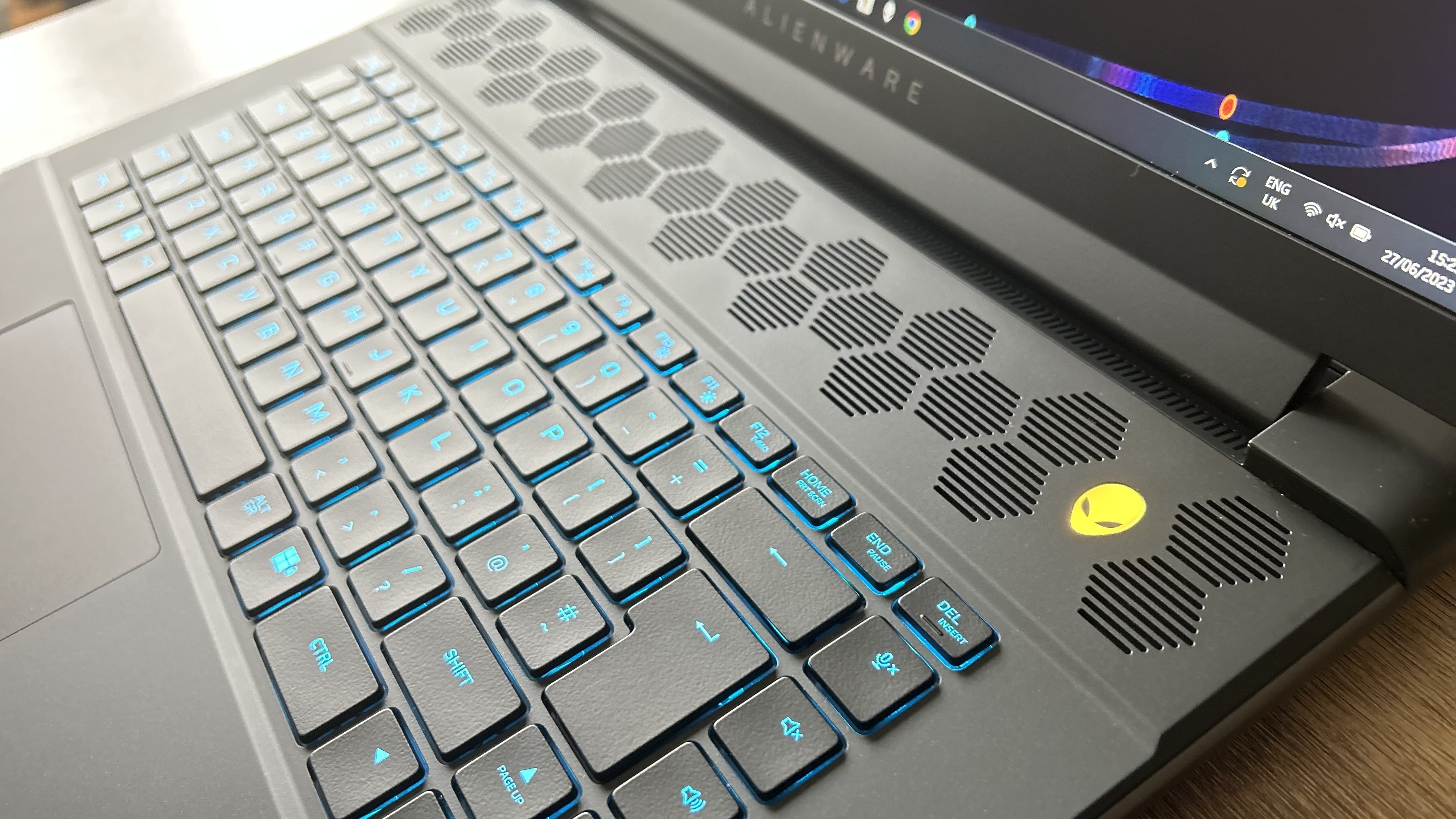
By contrast, the ports available to you remain dutifully bountiful. You're getting two speedy USB-C Gen 2 ports, as well as plenty of USB-As, an Ethernet, and a full SD card reader here. The latter options are becoming a rarity in modern gaming laptops, and fully open you up to all the connectivity you could ask for.
Under the hood, you'll find four fans situated in an expansive vapor chamber all working to keep those temperatures down. As is tradition, you're still getting the same control over those fans as in previous iterations, with Quiet and Full Fan mode at each end of the performance spectrum. For the most part, everything works as expected here, and I was pleasantly surprised by the temperature output with everything hitting full whack.
While the Alienware M15 R7 was among the loudest machines I've ever tested (even during everyday tasks sometimes), the M16 does its part to alleviate some of that auditory pressure. Yes, you can still toggle everything up to full RPM, but everyday play works well as standard settings. You'll still need a gaming headset for full immersion, but this by no means has the roar of the 15-incher before it.
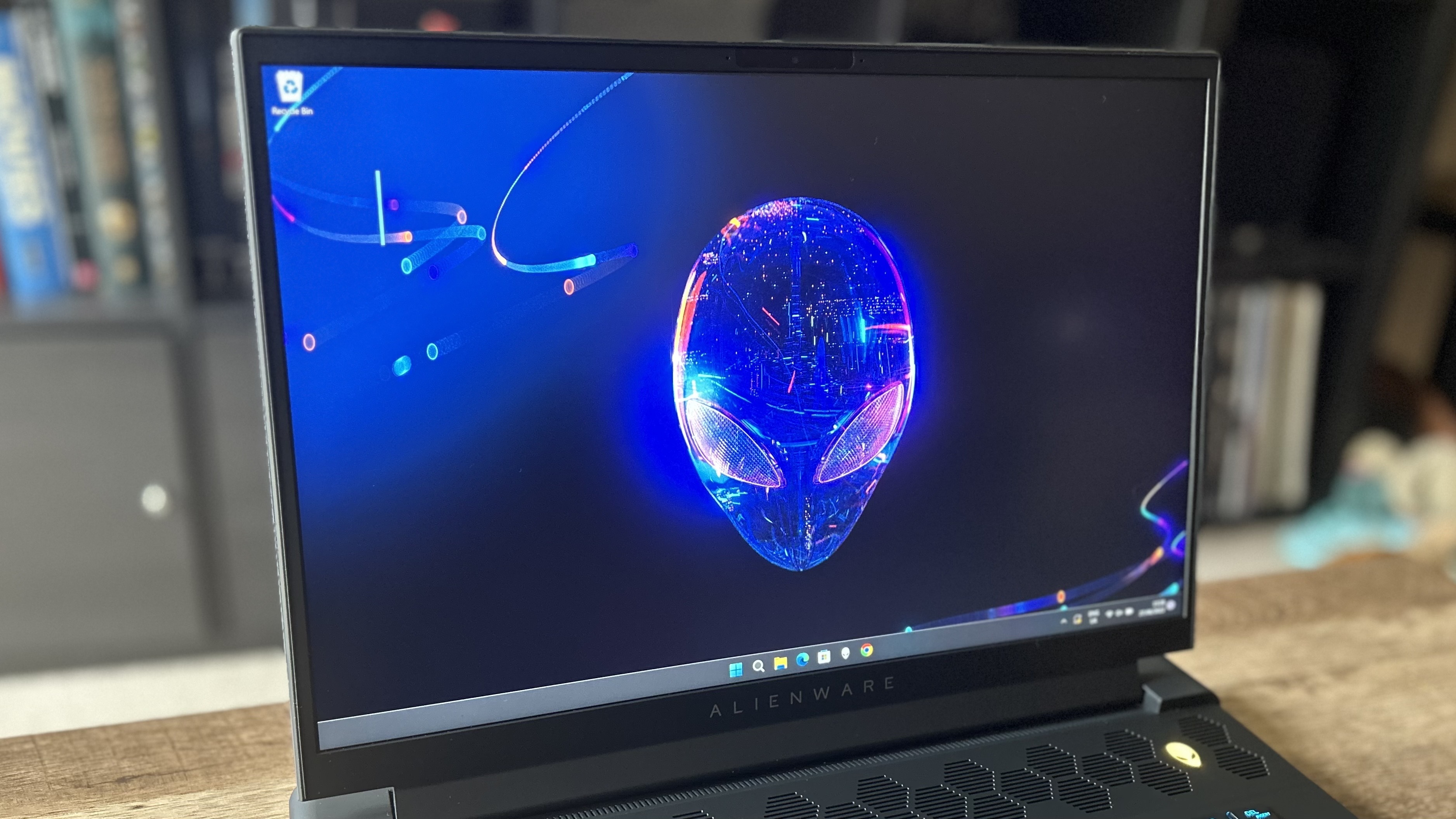
The display on my test unit is a QHD+ 16-inch IPS panel running at 165Hz, the cheapest panel available in the current lineup (you can also pick up an FHD+ 480Hz model, but Alienware doesn't offer this screen with the cheaper 512GB SSD option). There's no denying it, this is an impressive screen. No, it's not following the Mini LED trend of the day, but it still offers plenty of color contrast and a viewing angles. It's by no means as vibrant as some of the displays on the latest Asus gaming laptops, but with this Dell engineering behind it it manages to punch slightly above other IPS QHD+ options out there. In everyday practice, the only sacrifice I noticed was the drop in brightness.
Performance
Time Spy: 10,139
Fire Strike: 23,624
PCMark10: 6,544
Cinebench R23 (Multi): 18,643
Crystal Disk Mark: R - 6,417 MB/s | W - 3,826 MB/s
This is my first time hands-on with a lower-rung RTX 40-Series GPU, and I'm still impressed. Alienware's M-Series laptops have always held their own in the performance department, drawing as much as they can out of their components for a slick experience overall. That's still true in the new M16.
The new release came surprisingly close to the performance of the higher-specced RTX 3070 Ti under the hood of the M15 R7 I tested last year. A Time Spy score of 10,139 just grazes the M15's 10,722 and in-game benchmarks exceed those of the previous generation.
Even with an RTX 4060 at the helm, the M16 was hitting well over 100fps in the vast majority of my 1080p and 1440p tests, across both High and Ultra settings. Hitman 3 was the only game to consistently drop below this threshold, with ray tracing and DLSS switched on it was hitting between 79 and 92fps. That's still commendable, considering the M15 dipped to 72fps in its lowest in-game benchmark (Metro Exodus) this time last year.
At its baseline spec, then, the Alienware M16 is still capable of running pretty much anything you can throw at it at speeds we would have killed for just a few years ago.
| Row 0 - Cell 0 | 1080p | 1440p |
| Shadow of the Tomb Raider | High: 159fps | Highest: 150fps | High: 120fps | Highest: 111fps |
| Total War: Three Kingdoms | High: 132fps | Ultra: 102fps | High: 105fps | Highest: 74fps |
| Rainbow Six Extraction | High: 190fps | Ultra: 149fps | High: 122fps | Ultra: 97fps |
| Returnal | High: 124fps | Epic: 98fps | High: 103fps | Epic: 87fps |
| Hitman 3 | High: 92fps | Ultra: 86fps | High: 83fps | Ultra: 79fps |
Should you buy the Alienware M16?
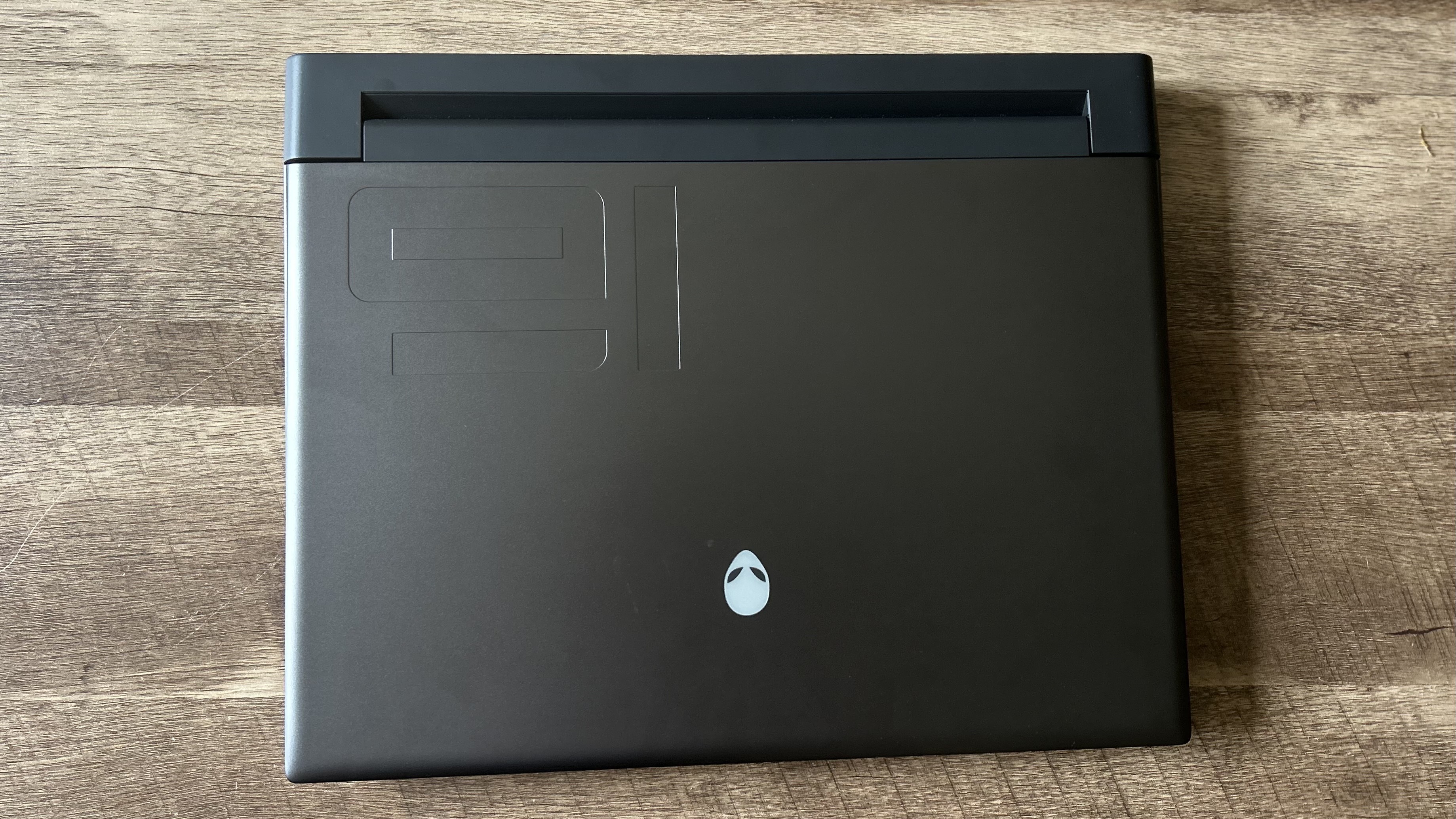
The Alienware M-Series has always been a solid go-to for performance that won't break the bank like some flagship devices. You're getting excellent numbers and spending far less than $2,000. This is the cheapest 2023 device I've had my hands on so far, and it's still posting in-game benchmarks that can wrestle with the big guns.
There's no doubt about it, though - this is a chunky build. Those graphics only have the room to perform at this level thanks to the extra space within the chassis, but that heft does limit what you can physically do with the M16. I wouldn't recommend this machine to anyone looking to travel with their rig, it's just too bulky and heavy.
There are other drawbacks to that power-first approach, though. The larger footprint is paired with a cumbersome design. That additional space behind the screen itself has lingered a little too long, and the aesthetics are starting to feel a little worn out in 2023 as well. The lack of space underneath the keyboard and trackpad also means the M16 isn't going to fare well as a lap device.
If you're after a more streamlined, more portable device, I could not recommend the Asus ROG Zephyrus G14 highly enough. However, those looking to preserve the larger screen size might be better off with the Asus ROG Strix 16 which weighs in at 2.5kg compared to the M16's 3.25kg.
The M16 does hit a nice niche, though. If you're looking for a desktop-first device (with the opportunity to take it on the go should you need to), this is an excellent alternative to the Razer Blade 18 and Alienware M18 at the top of the price spectrum.
How we tested the Alienware M16
I used the Alienware M16 for all my daily work and play over the course of three weeks, testing for some of that time alongside the Asus ROG Zephyrus G14. During this process, I used in-game benchmarking tools across Shadow of the Tomb Raider, Total War: Three Kingdoms, Rainbow Six Extraction, Returnal and Hitman 3, while also playing Alan Wake: Remastered and High on Life during everyday play. For more information on how we test gaming laptops, check out the full GamesRadar+ Hardware Policy.
Of course, we're also rounding up all the best Razer laptops and helping you find a discount with our full guides to the latest Alienware laptop deals and all the biggest gaming laptop deals on the shelves right now as well.

Managing Editor of Hardware at GamesRadar+, I originally landed in hardware at our sister site TechRadar before moving over to GamesRadar. In between, I've written for Tom’s Guide, Wireframe, The Indie Game Website and That Video Game Blog, covering everything from the PS5 launch to the Apple Pencil. Now, i'm focused on Nintendo Switch, gaming laptops (and the keyboards, headsets and mice that come with them), PS5, and trying to find the perfect projector.
